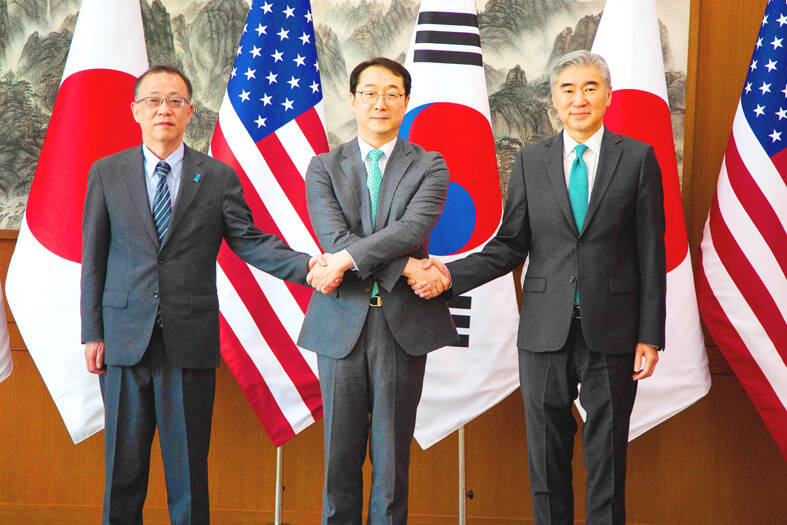Seoul, Washington and Tokyo yesterday urged UN member states to repatriate North Koreans working overseas, saying they continue to evade sanctions abroad to finance Pyongyang’s unlawful weapons program.
North Korea was also engaged in “malicious cyber activities” that supported its military expansion, representatives of the three countries said in a joint statement.
The nuclear-armed country has long made a fortune from the army of citizens it sends abroad to work, mostly in neighboring China and Russia, but also in Europe, the Middle East and Africa.

Photo: AFP
Under a UN Security Council resolution unanimously approved in 2017, member states had until December 2019 to send back all North Koreans working in their countries.
However, Seoul, Tokyo and Washington’s special envoys for North Korea yesterday said the country’s overseas workers are continuing to help fund Pyongyang’s increasingly aggressive provocations, following a trilateral meeting in the South Korean capital.
Overseas North Korean information technology workers “continue using forged identities and nationalities to evade [UN] sanctions and earn income abroad that funds the DPRK’s unlawful weapon of mass destruction and ballistic missile programs,” the envoys said in a joint statement, using the acronym for North Korea’s official name.
“We are also deeply concerned about how the DPRK supports these programs by stealing and laundering funds, as well as gathering information through malicious cyber activities,” they said.
The envoys accused Pyongyang of stealing up to US$1.7 billion in cryptocurrency last year.
In 2019, analysts said Beijing and Moscow — Pyongyang’s key allies — were issuing North Korean workers with alternative visas to ensure a continued supply of cheap labor.
North Korea last year declared itself an “irreversible” nuclear power, effectively ending the possibility of denuclearization talks.
North Korean Leader Kim Jong-un ordered his military to intensify drills last month to prepare for a “real war.”
In recent weeks, North Korea has tested what state media has claimed was an underwater, nuclear-capable drone, and carried out the launch of an intercontinental ballistic missile.
“We strongly condemn the DPRK’s repeated ballistic missile launches, as well as its escalatory and destabilizing rhetoric related to the use of nuclear weapons,” the envoys said.
“We express deep regret that the DPRK continues to ignore the hardship of its people, choosing instead to pour its scarce resources into its [weapons of mass destruction] and ballistic missile programs in clear violation of multiple United Nations Security Council resolutions,” they said.

SECURITY: As China is ‘reshaping’ Hong Kong’s population, Taiwan must raise the eligibility threshold for applications from Hong Kongers, Chiu Chui-cheng said When Hong Kong and Macau citizens apply for residency in Taiwan, it would be under a new category that includes a “national security observation period,” Mainland Affairs Council (MAC) Minister Chiu Chui-cheng (邱垂正) said yesterday. President William Lai (賴清德) on March 13 announced 17 strategies to counter China’s aggression toward Taiwan, including incorporating national security considerations into the review process for residency applications from Hong Kong and Macau citizens. The situation in Hong Kong is constantly changing, Chiu said to media yesterday on the sidelines of the Taipei Technology Run hosted by the Taipei Neihu Technology Park Development Association. With

CARROT AND STICK: While unrelenting in its military threats, China attracted nearly 40,000 Taiwanese to over 400 business events last year Nearly 40,000 Taiwanese last year joined industry events in China, such as conferences and trade fairs, supported by the Chinese government, a study showed yesterday, as Beijing ramps up a charm offensive toward Taipei alongside military pressure. China has long taken a carrot-and-stick approach to Taiwan, threatening it with the prospect of military action while reaching out to those it believes are amenable to Beijing’s point of view. Taiwanese security officials are wary of what they see as Beijing’s influence campaigns to sway public opinion after Taipei and Beijing gradually resumed travel links halted by the COVID-19 pandemic, but the scale of

A US Marine Corps regiment equipped with Naval Strike Missiles (NSM) is set to participate in the upcoming Balikatan 25 exercise in the Luzon Strait, marking the system’s first-ever deployment in the Philippines. US and Philippine officials have separately confirmed that the Navy Marine Expeditionary Ship Interdiction System (NMESIS) — the mobile launch platform for the Naval Strike Missile — would take part in the joint exercise. The missiles are being deployed to “a strategic first island chain chokepoint” in the waters between Taiwan proper and the Philippines, US-based Naval News reported. “The Luzon Strait and Bashi Channel represent a critical access

Pope Francis is be laid to rest on Saturday after lying in state for three days in St Peter’s Basilica, where the faithful are expected to flock to pay their respects to history’s first Latin American pontiff. The cardinals met yesterday in the Vatican’s synod hall to chart the next steps before a conclave begins to choose Francis’ successor, as condolences poured in from around the world. According to current norms, the conclave must begin between May 5 and 10. The cardinals set the funeral for Saturday at 10am in St Peter’s Square, to be celebrated by the dean of the College